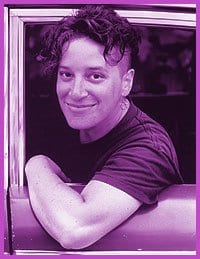An ebullient and butchly dapper Karen X Tulchinsky charmed an overflowing Sunday bagel crowd at Toronto’s downtown Miles Nadal Jewish Community Centre last month, reading from her new historical novel The Five Books Of Moses Lapinsky.
The book presents the fictitious Lapinsky family, who fled Russian pogroms to struggle anew in Toronto’s Kensington Market as door-to-door peddlers at the height of the Depression. The story is set amid the intimidation of immigrants by fascist gangs in Toronto’s east-end Beaches neighbourhood and the infamous Christie Pits riots of August 1933, sparked by a gang displaying a swastika banner at a Jewish neighbourhood baseball game.
Complete with tragicomic Jewish intonation, humour and occasional malapropisms, the novel recounts the challenges facing a young Jewish immigrant family in a time of profound physical and spiritual struggle. To those who suggest her renderings of Jewish culture are stereotypical and sentimental, Tulchinsky says: “You haven’t met my family yet. They really do talk like this.”
The book emerged out of Tulchinsky’s desire to explore the family legends she often heard at her grandfather’s house. Years of exhaustive research followed, including interviews with family and community members, studying newspaper accounts from 1930 to 1954 and academic histories on the Christie Pits riots and the rise of international fascism in the interwar period.
At centre stage is an embattled and misunderstood boxer, Sonny “The Charger” Lapinsky, who struggles determinedly to become someone in a new country while dealing with his rage and grief at his brother Izzy’s injury during the riots.
Moses Lapinsky is Sonny’s gentle and gay scholarly son. His research notes on a biography of his misunderstood pugnacious father are set in the present day. Moses’ name and the “Five Books” of the title are allusions to Jewish liberation. As with Tulchinsky’s process in writing the book, Moses’ project attempts to unearth and reconcile self, family, community and history. Thoughout, there is a tension between traditional obligations and new world demands.
Tulchinsky’s evident knowledge of butch/femme erotic culture and her affectionate sensitivity to expressions of gender lead to interesting characterizations. It is not often one sees such sympathetic and varied portrayals of vulnerable masculinity, macho bluster, feminine strength or dynamics of male bonding and heterosexual courtship created by a lesbian author. This book is truly queer – and very Jewish – but its insights are universal and challenging.
Lenny is Sonny’s bookish older brother, who takes up with an older bachelor librarian, Ted, as his entré into literary life. Lenny’s Jewish sissy boy masculinity is not wholly derided by his family, who value learning and gentleness. His inchoate queerness is undefined, even in his unconscious passion for his Canadian war buddy Charlie Bain, who remains oblivious to Lenny’s devotion. “Lenny’s the kind of guy who would never have come out in that day,” says Tulchinsky. “He would have been seen as a little ‘light in the loafers’ and would have remained a well-dressed bachelor uncle all his life.”
Ted, the fastidious librarian, and James, his apparent lover, are more obviously queer, joking over their non-enlistment in the armed forces, and abandoning Lenny when he appears to enter into heterosexual life.
Tulchinsky’s awareness of butch vulnerability allows her to make Charlie’s unwitting entry into a swastika gang sympathetic. As a young man, Charlie is clearly seeking masculine bonding, social ties and ethnic pride in joining with a group, whose brutality later disgusts him.
Tulchinsky says that she found Charlie’s hapless and easy slide into ignorance and violent intolerance particularly important to inform our present experience of virulent anti-Semitism. “I’m a Canadian often critical of the prime minister,” says Tulchinsky. “But I don’t see Canada vilified to the same extent Israel is these days. I’ve never even been to Israel, and I feel a need to respond.”
Tulchinsky is now working on a film adaptation of the novel and doing a cross-Canada book tour. She will return to Toronto to read at the Jewish Book Fair at the Bathurst Jewish Community Centre (4588 Bathurst St) on Wed, Nov 12.
THE FIVE BOOKS OF MOSES LAPINSKY.
Karen X Tulchinksy.
Polestar Press.
480 pages. $34.95.

 Why you can trust Xtra
Why you can trust Xtra


